This project is part of the @thi.ng/umbrella monorepo.
- About
- Temporary restrictions
- Breaking changes
- Installation
- Dependencies
- Usage examples
- API
- Authors
- License
Mutable wrappers for nested immutable values with optional undo/redo history and transaction support.
Additional support for:
- type checked value access for up to 8 levels of nesting (deeper values
default to
any) - watches (listeners)
- derived, eager/lazy view subscriptions (w/ optional transformation)
- cursors (direct R/W access to nested values)
- transacted updates (incl. nested transactions)
- undo/redo history
Together, these types act as building blocks for various application state handling patterns, specifically aimed (though not exclusively) at the concept of using a centralized atom around a nested, immutable object as single source of truth within an application and driving reactive updates from performed state changes.
STABLE - used in production
Search or submit any issues for this package
Due to a change of inferencing rules in TypeScript 4.3 with regards to tuples, the IReset and ISwap interface definitions in this package had to be updated and removed support for lookup path lengths > 6. This change is expected to be temporary only and is tracked by #303.
The resetIn() and swapIn() methods are fully type checked (up to 8
levels deep), with the given value paths (and the new state value) being
validated against the structure of the containers's main value type.
Since that kind of type checking can only be done via tuples, string
paths are NOT supported anymore and instead require using the
resetInUnsafe() and swapInUnsafe() methods, which now provide the
legacy, unchecked update functionality. More details below.
The use of the Unsafe suffix is inspired by Rust and, for consistency,
now used across other umbrella packages providing both checked and
unchecked variations.
Users are encouraged to use the new set of (type checked) factory
functions in lieu of direct constructor invocations. These functions are
now considered the defacto way to create new instances are generally
starting to be provided more consistently across the umbrella ecosystem.
All of them use the def prefix, e.g. defAtom(), defCursor() etc.
Unsafe versions exist for some types too. More
info
Derived views can now only be created via defView(), defViewUnsafe()
(or new View()). The IViewable interface and .addView() methods
have been removed.
- @thi.ng/interceptors - Interceptor based event bus, side effect & immutable state handling
- @thi.ng/paths - Immutable, optimized and optionally typed path-based object property / array accessors with structural sharing
- @thi.ng/rstream - Reactive streams & subscription primitives for constructing dataflow graphs / pipelines
yarn add @thi.ng/atomES module import:
<script type="module" src="https://cdn.skypack.dev/@thi.ng/atom"></script>For Node.js REPL:
# with flag only for < v16
node --experimental-repl-await
> const atom = await import("@thi.ng/atom");
Package sizes (gzipped, pre-treeshake): ESM: 1.93 KB
Several demos in this repo's /examples directory are using this package.
A selection:
| Screenshot | Description | Live demo | Source |
|---|---|---|---|
| BMI calculator in a devcards format | Demo | Source | |
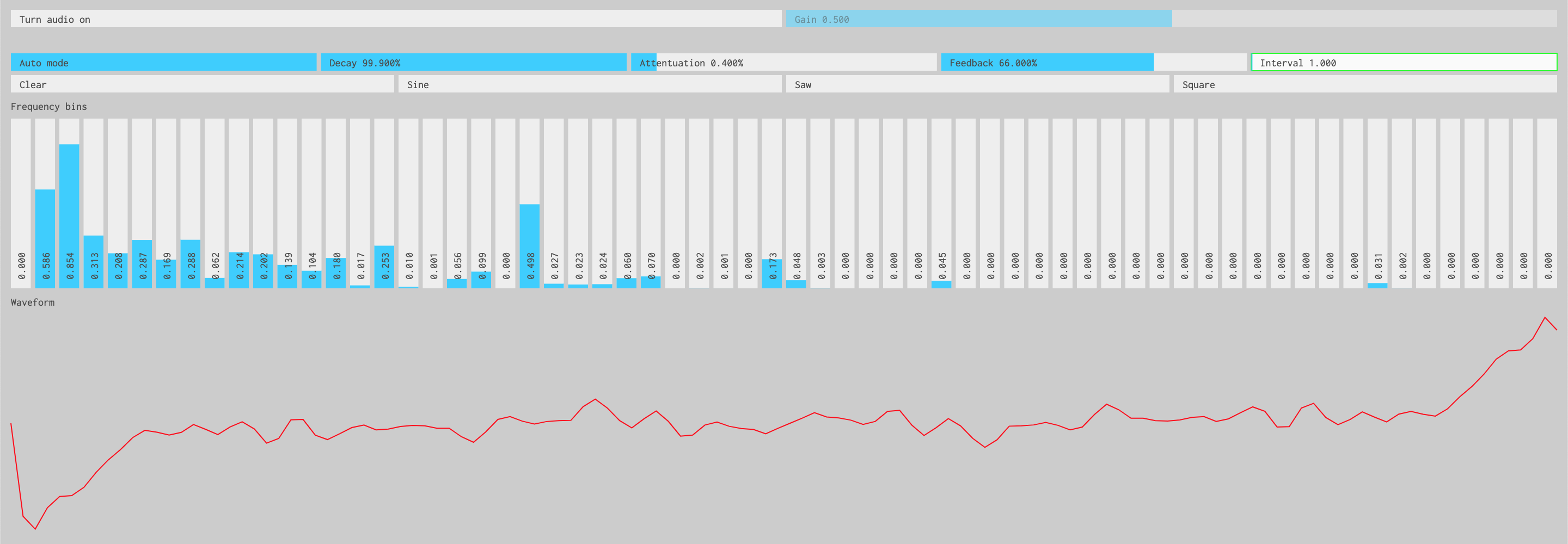 |
Interactive inverse FFT toy synth | Demo | Source |
| Custom dropdown UI component for hdom | Demo | Source | |
| Custom dropdown UI component w/ fuzzy search | Demo | Source | |
| Using custom hdom context for dynamic UI theming | Demo | Source | |
| Hiccup / hdom DOM hydration example | Demo | Source | |
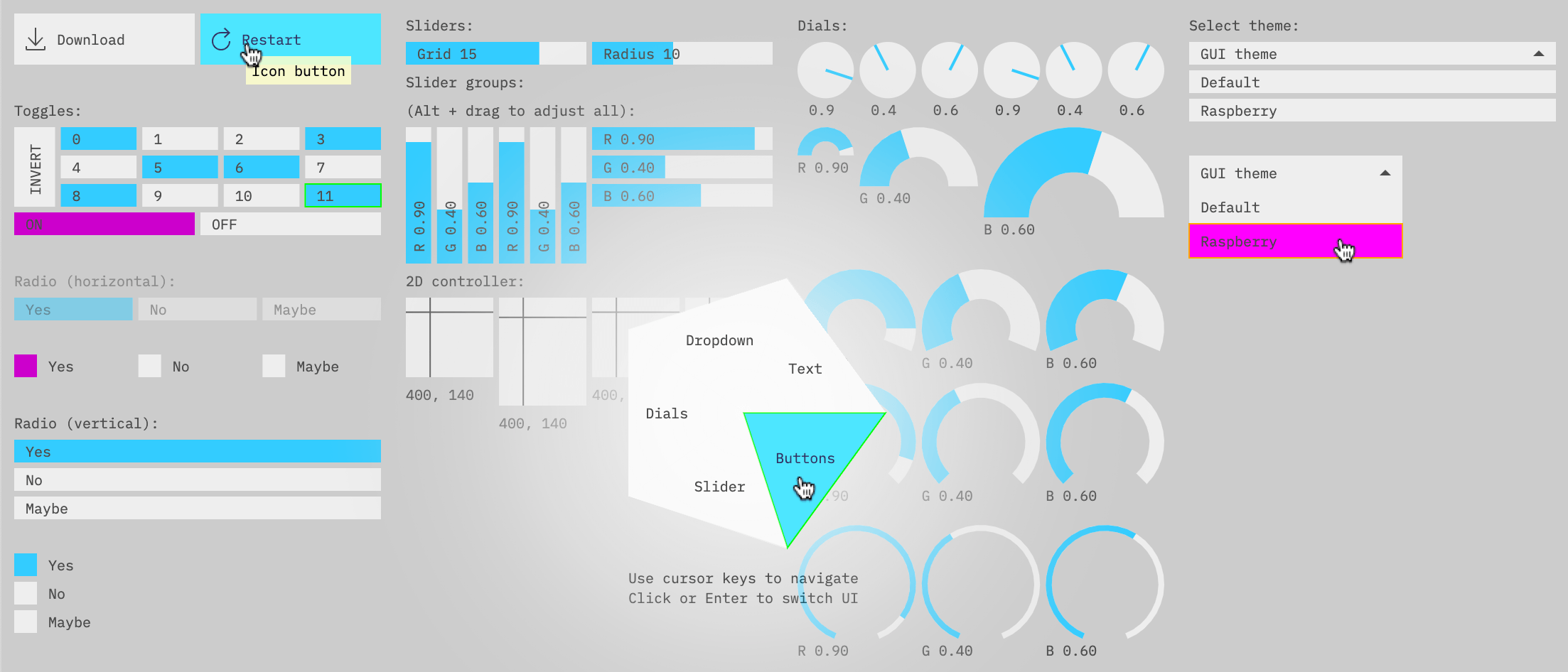 |
Canvas based Immediate Mode GUI components | Demo | Source |
| Basic SPA example with atom-based UI router | Demo | Source | |
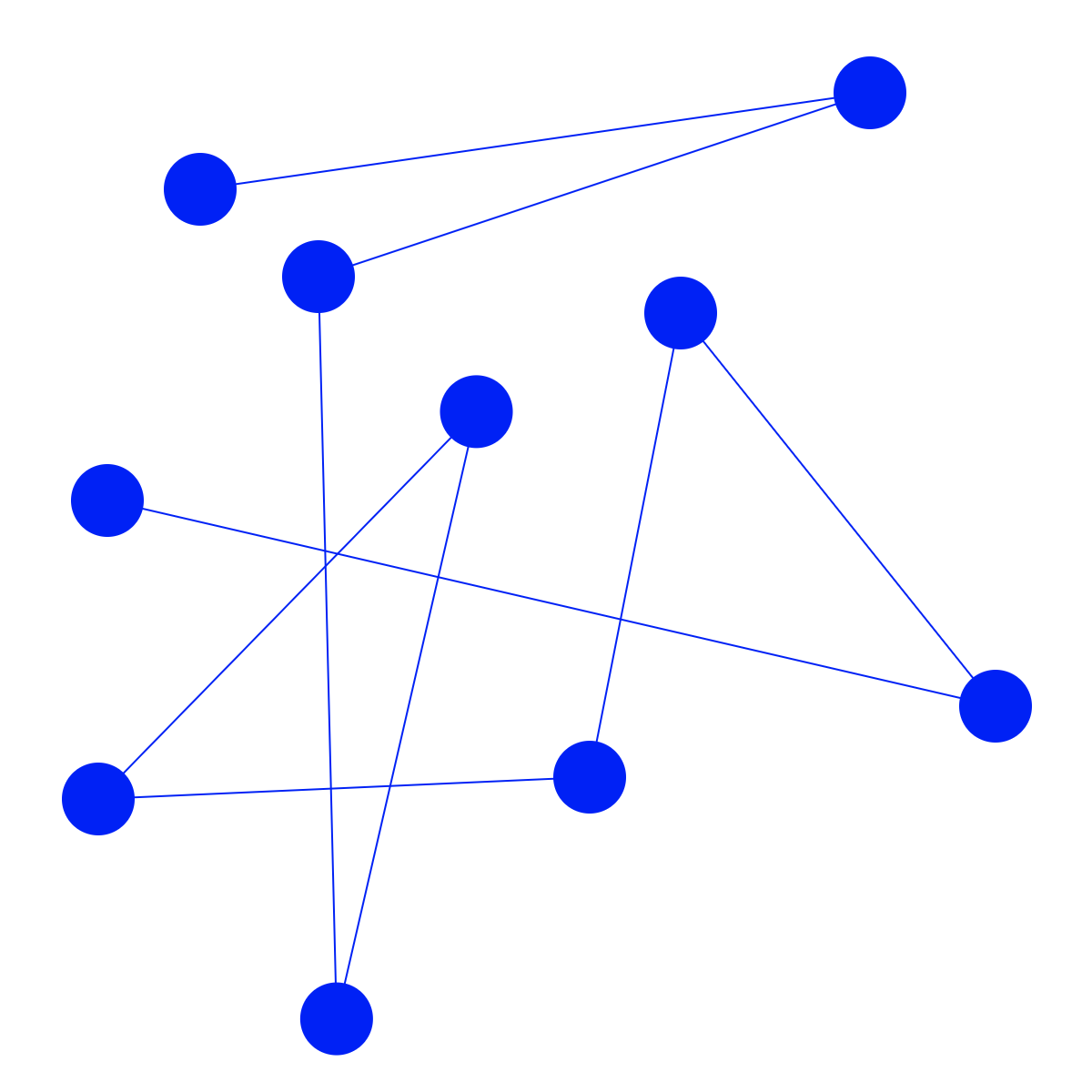 |
rdom powered SVG graph with draggable nodes | Demo | Source |
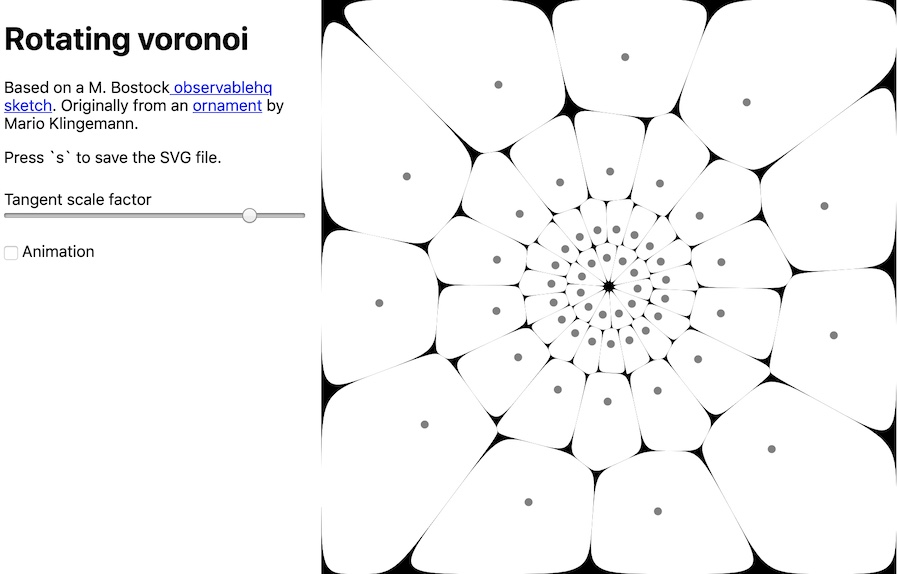 |
Animated Voronoi diagram, cubic splines & SVG download | Demo | Source |
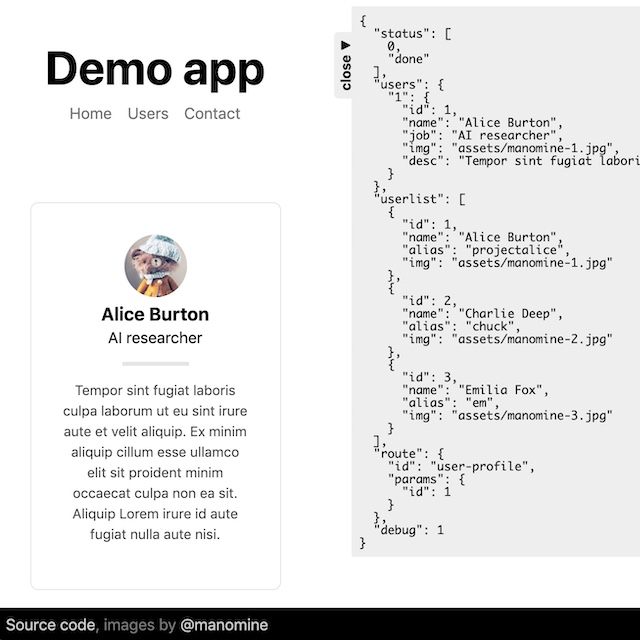 |
Complete mini SPA app w/ router & async content loading | Demo | Source |
| Minimal rstream dataflow graph | Demo | Source | |
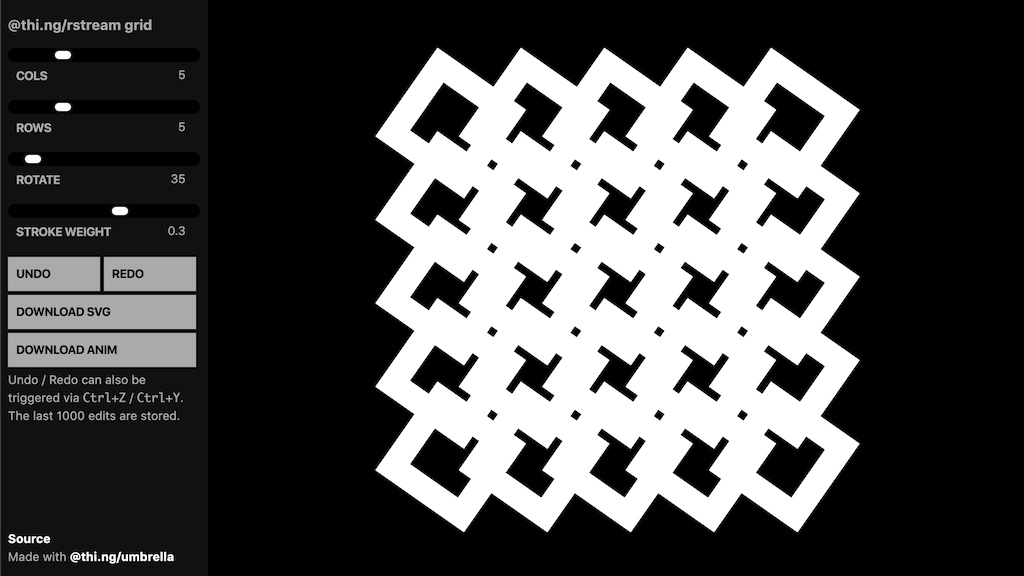 |
Interactive grid generator, SVG generation & export, undo/redo support | Demo | Source |
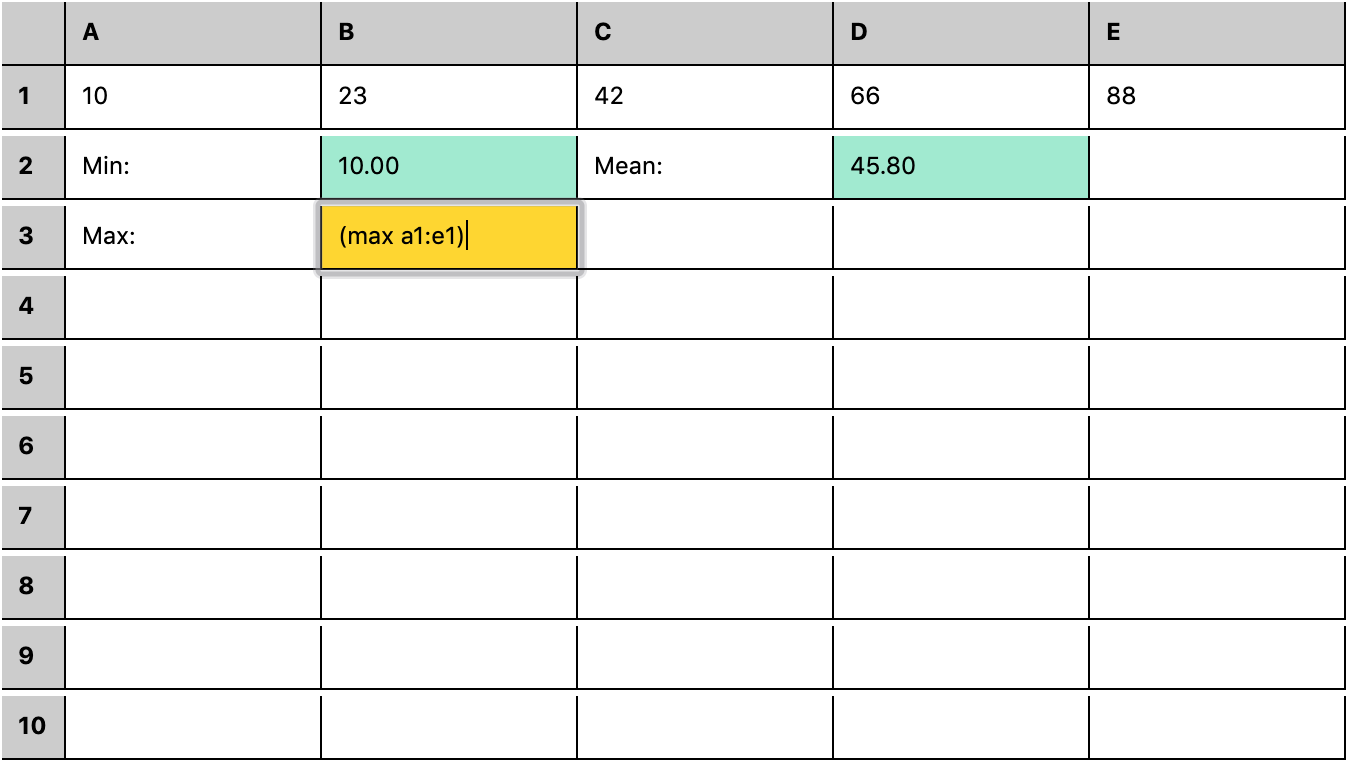 |
rstream based spreadsheet w/ S-expression formula DSL | Demo | Source |
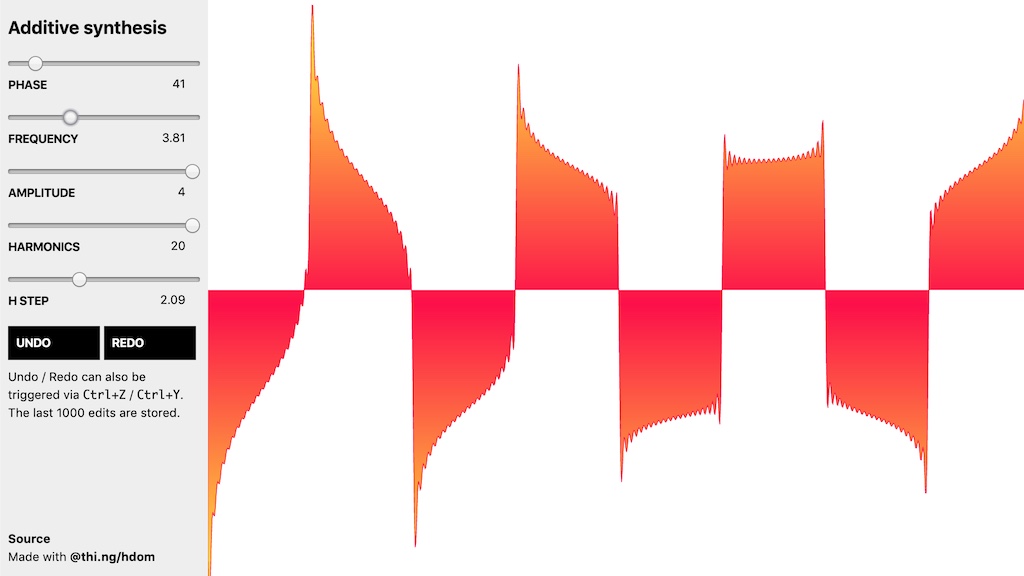 |
Additive waveform synthesis & SVG visualization with undo/redo | Demo | Source |
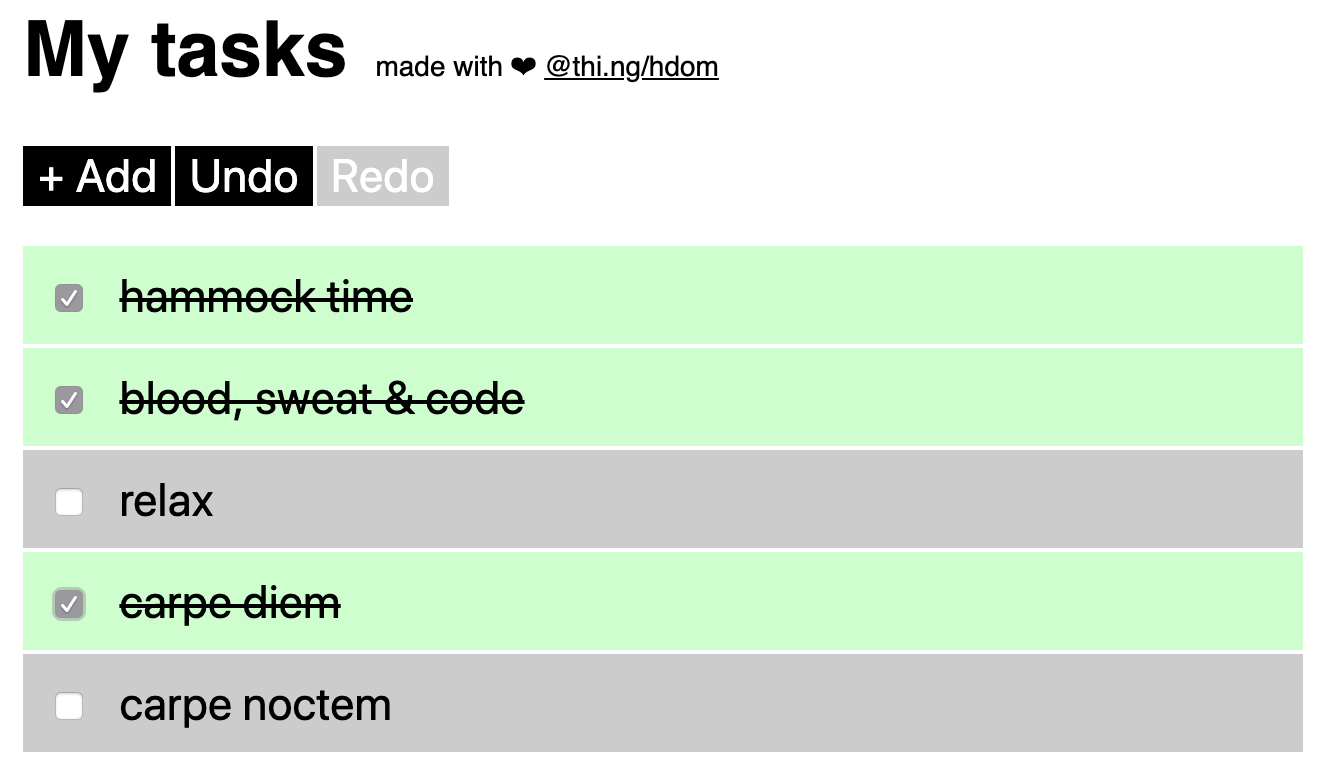 |
Obligatory to-do list example with undo/redo | Demo | Source |
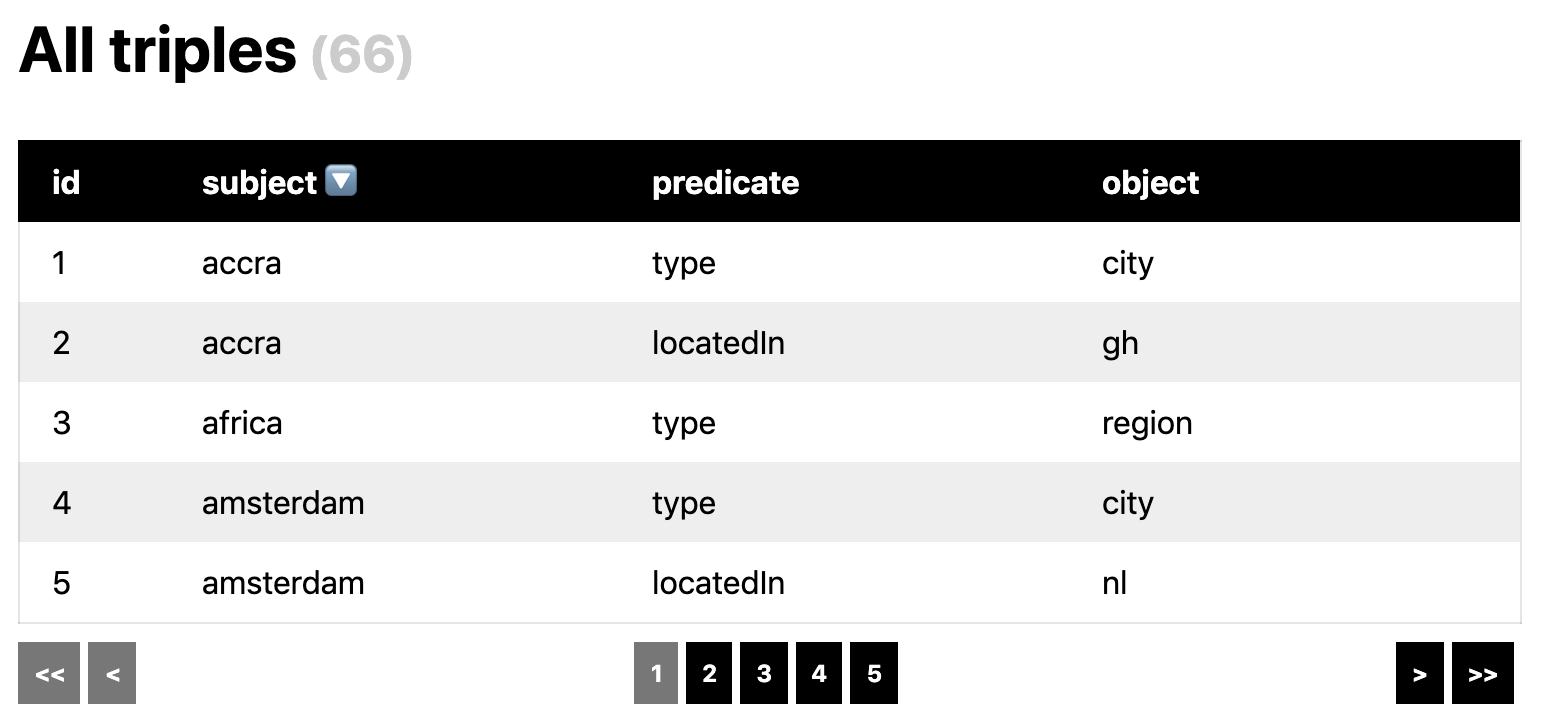 |
Triple store query results & sortable table | Demo | Source |
An Atom is a mutable (typed) wrapper for supposedly immutable values.
The wrapped value can be obtained via deref(), replaced via reset()
and updated using swap(). An atom too supports the concept of watches,
essentially onchange event handlers which are called from reset /
swap and receive both the old and new atom values.
Note: The IDeref
interface
is widely supported across many thi.ng/umbrella packages and implemented
by most value wrapper types.
import { defAtom } from "@thi.ng/atom";
const a = defAtom(23);
// obtain value via deref()
a.deref();
// 23
// add watch to observe value changes
a.addWatch("foo", (id, prev, curr) => console.log(`${id}: ${prev} -> ${curr}`));
// true
// example update function
const add = (x, y) => x + y;
// apply given function to current value
// (incl. any additional arguments passed to swap)
// this is the same as:
// a.reset(adder(a.deref(), 1))
a.swap(add, 1);
// foo: 23 -> 24
// reset atom's value
a.reset(42);
// foo: 24 -> 42When Atom-like containers are used to wrap nested object values, the
resetIn() / swapIn() methods can be used to directly update nested
values. These updates are handled via immutable setters provided by
@thi.ng/paths.
const db = defAtom({ a: { b: 1, c: 2 } });
// type checked access
db.resetIn(["a", "b"], 100);
// { a: { b: 100, c: 2 } }
// unchecked access
db.resetInUnsafe("a.b", 100);
// { a: { b: 100, c: 2 } }
// type checked access
// type of `x` in update function is automatically inferred too
db.swapIn(["a", "c"], (x) => x + 1);
// { a: { b: 100, c: 3 } }
// unchecked access
db.swapInUnsafe("a.c", (x) => x + 1);
// { a: { b: 100, c: 4 } }If the update path is created dynamically, you will have to use one of these approaches:
interface Item {
name: string;
}
const db = defAtom<Item[]>([{ name: "thi.ng" }, { name: "atom" }]);
const id = 1;
// using <const> expr
db.resetIn(<const>[id, "name"], "umbrella");
// unchecked
db.resetInUnsafe([id, "name"], "umbrella");
// unchecked (string path)
db.resetInUnsafe(`${id}.name`, "umbrella");Since v3.1.0, multiple sequential state updates can be grouped in transactions and then applied in one go (or canceled altogether). This can be useful to produce a clean(er) sequence of undo snapshots (see further below) and avoids multiple / obsolete invocations of watches caused by each interim state update. Using a transaction, the parent state is only updated once and watches too are only notified once after each commit.
Transactions can also be canceled, thus not impacting the parent state at all.
Transacted can wrap any existing
IAtom
implementation, e.g. Atom, Cursor or History instances.
Transacted also implements IAtom itself...
const db = defAtom<any>({ a: 1, b: 2 });
const tx = defTransacted(db);
// start transaction
tx.begin();
// alternatively use syntax sugar for:
// `defTransacted(db).begin()`
tx = beginTransaction(db);
// perform multiple updates
// (none of them are applied to the parent state
// until `commit` is called)
// IMPORTANT: calling any of these update methods without
// a running transaction will throw an error!
tx.resetIn(["a"], 11);
tx.resetIn(["c"], 33);
// tx.deref() will always return latest state
tx.deref()
// { a: 11, b: 2, c: 33 }
// however, at this point the parent
// still contains pre-transaction state...
db.deref()
// { a: 1, b: 2 }
// apply all changes at once (or `cancel()` transaction)
tx.commit();
// { a: 11, b: 2, c: 33 }
// verify parent state
db.deref()
// { a: 11, b: 2, c: 33 }Nested transactions on a single Transacted instance are not
supported and attempting to do so will throw an error. However, nested
transactions can be achieved by wrapping another Transacted container.
const tx1 = beginTransaction(db);
tx1.resetIn(["a"], 10);
// nested transaction
const tx2 = beginTransaction(tx1);
tx2.resetIn(["b"], 20);
tx2.commit();
tx1.commit();
db.deref();
// { a: 10, b: 20 }An error will be thrown if the parent change receives any updates whilst a transaction is active. This is to guarantee general data integrity and to signal race conditions due to erroneous / out-of-phase state update logic.
const tx = beginTransaction(db);
tx.resetIn(["a"], 10);
// attempting to update parent will throw an error
db.resetIn(["a"], 2);Cursors provide direct & immutable access to a nested value within a
structured atom. The path to the desired value must be provided when the
cursor is created and cannot be changed later. Since v4.0.0, the path
itself is type checked and MUST be compatible with the type of the
parent state (or use defCursorUnsafe() as fallback, see breaking
changes). The path is then compiled into a getter
and
setter
to allow cursors to be used like atoms and update the parent state in an
immutable manner (i.e. producing an optimized copy with structural
sharing of the original (as much as possible)) - see further details
below.
It's important to remember that cursors also cause their parent state (atom or another cursor) to reflect their updated local state. I.e. any change to a cursor's value propagates up the hierarchy of parent states and also triggers any watches attached to the parent.
a = defAtom({a: {b: {c: 1}}})
// cursor to `b` value
b = defCursor(a, "a.b")
// cursor to `c` value, relative to `b`
c = defCursor(b, "c")
c.reset(2);
b.deref();
// { c: 2 }
a.deref();
// { a: { b: { c: 2 } } }For that reason, it's recommended to design the overall data layout rather wide than deep (my personal limit is 3-4 levels) to minimize the length of the propagation chain and maximize structural sharing.
// main state
main = defAtom({ a: { b: { c: 23 }, d: { e: 42 } }, f: 66 });
// cursor to `c` value
cursor = defCursor(main, ["a", "b", "c"]);
// or
cursor = defCursorUnsafe<number>(main, "a.b.c");
// add watch just as with Atom
cursor.addWatch("foo", console.log);
cursor.deref();
// 23
cursor.swap(x => x + 1);
// foo 23 24
main.deref();
// { a: { b: { c: 24 }, d: { e: 42 } }, f: 66 }Whereas cursors provide read/write access to nested key paths within a
state atom, there are many situations when one only requires read access
and the ability to (optionally) produce transformed versions of such a
value. The View type provides exactly this functionality:
db = defAtom({ a: 1, b: { c: 2 } });
// create a view for a's value
viewA = defView(db, ["a"]);
// create a view for c's value w/ transformer
viewC = defView(db, ["b","c"], (x) => x * 10);
// or unchecked
viewC = defViewUnsafe(db, "b.c", (x) => x * 10);
viewA.deref()
// 1
viewC.deref()
// 20
// update the atom
db.resetIn(["b","c"], 3)
// views can indicate if their value has changed
// (will be reset to `false` after each deref)
// here viewA hasn't changed (we only updated `c`)
viewA.changed()
// false
viewC.changed()
// true
// the transformer function is only executed once per value change
viewC.deref()
// 30
// just returns current cached transformed value
viewC.deref()
// 30
// discard views
viewA.release()
viewC.release()Since v1.1.0 views can also be configured to be eager, instead of the
"lazy" default behavior. If the optional lazy arg is true (default),
the view's transformer will only be executed with the first deref()
after each value change. If lazy is false, the transformer function
will be executed immediately after a value change occurred and so can be
used like a selective watch which only triggers if there was an actual
value change (in contrast to normal watches, which execute with each
update, regardless of value change).
Related, the actual value change predicate can be customized. If not
given, the default @thi.ng/equiv will be used.
let x = 0;
let a = defAtom({ value: 1 })
// create an eager view by passing `false` as last arg
view = defView(a, ["value"], (y) => (x = y, y * 10), false);
// check `x` to verify that transformer already has run
x === 1
// true
// reset x
x = 0
// verify transformed value
view.deref() === 10
// true
// verify transformer hasn't rerun because of deref()
x === 0
// trueAtoms & views are useful tools for keeping state outside UI components. Here's an example of a tiny @thi.ng/hdom web app, demonstrating how to use derived views to switch the UI for different application states / modules.
Note: The constrained nature of this next example doesn't really do
justice to the powerful nature of the approach. Also stylistically, in a
larger app we'd want to avoid the use of global variables (apart from
db) as done here...
For a more advanced / realworld usage pattern, check the related event handling package and bundled examples.
This example is also available in standalone form:
import type { Nullable, Path } from "@thi.ng/api";
import { defAtom, defView } from "@thi.ng/atom";
import { start } from "@thi.ng/hdom";
import { capitalize } from "@thi.ng/strings";
interface State {
state: string;
error?: string;
user: {
name?: string;
};
}
// central immutable app state
const db = defAtom<State>({ state: "login", user: {} });
// define views for different state values
const appState = defView(db, ["state"]);
// the error view converts the state value into a UI component array
const error = defView(db, ["error"], (error) =>
error ? ["div.error", error] : null
);
// view transformer for the username value
const user = defView(db, ["user", "name"], (name) =>
name ? capitalize(name) : null
);
// state update functions
// trigger new route / UI view
const setState = (s: string) => setValue(appState.path, s);
const setError = (err: Nullable<string>) => setValue(error.path, err);
const setUser = (e: Event) => setValue(user.path, (<any>e.target).value);
const setValue = (path: Path, val: any) => db.resetInUnsafe(path, val);
const loginUser = () => {
if (user.deref() === "admin") {
setError(null);
setState("main");
} else {
setError("sorry, wrong username (try 'admin')");
}
};
const logoutUser = () => {
setValue(user.path, null);
setState("logout");
};
// UI components for different app states
// note how the value views are used here
const uiViews: any = {
// dummy login form
login: () => [
"div#login",
["h1", "Login"],
// embedded error view (will auto-deref)
error.deref(),
["input", { type: "text", onchange: setUser }],
["button", { onclick: loginUser }, "Login"],
],
logout: () => [
"div#logout",
["h1", "Good bye"],
"You've been logged out. ",
["a", { href: "#", onclick: () => setState("login") }, "Log back in?"],
],
main: () => [
"div#main",
["h1", `Welcome, ${user.deref()}!`],
["div", "Current app state:"],
[
"div",
[
"textarea",
{ cols: 40, rows: 10 },
JSON.stringify(db.deref(), null, 2),
],
],
["button", { onclick: logoutUser }, "Logout"],
],
};
// finally define another derived view for the app state value
// including a transformer, which maps the current app state value
// to its correct UI component (incl. a fallback for illegal app states)
const currView = defView(
db,
["state"],
(state) => uiViews[state] || ["div", ["h1", `No component for state: ${state}`]]
);
// app root component
// embedded view (will auto-deref)
start(() => ["div", currView]);The History type can be used with & behaves just like an Atom or
Cursor, but too creates snapshots of the current state before applying
the new state. These snapshots are stored in a doubly-linked list and
can be navigated via .undo() / .redo(). Each time one of these
methods is called, the parent state will be updated and any attached
watches are notified. By default, the history has length of 100 steps,
though this is configurable via ctor args.
// create history w/ max. 100 steps
db = defHistory(defAtom({ a: 1 }), 100)
db.deref()
// { a: 1 }
db.reset({ a: 2, b: 3 })
db.reset({ b: 4 })
db.undo()
// { a: 2, b: 3 }
db.undo()
// { a: 1 }
db.undo()
// undefined (no more undo possible)
db.canUndo()
// false
db.redo()
// { a: 2, b: 3 }
db.redo()
// { b: 4 }
db.redo()
// undefined (no more redo possible)
db.canRedo()
// falseKarsten Schmidt
If this project contributes to an academic publication, please cite it as:
@misc{thing-atom,
title = "@thi.ng/atom",
author = "Karsten Schmidt",
note = "https://thi.ng/atom",
year = 2017
}© 2017 - 2021 Karsten Schmidt // Apache Software License 2.0